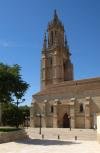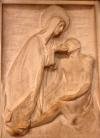
Commentary to the 31st Sunday in Ordinary Time – Year C
The passage starts presenting the Master who enters Jericho and crosses the city accompanied by the crowd and the disciples (v. 1). At the entrance of the city, he has just cured a blind man who begged him: “Lord, that I may see” (Lk 18:35-43). The combination of these two facts is not random. The healing of the blind man and the “recovery” of Zacchaeus reflect and illuminate each other.




















